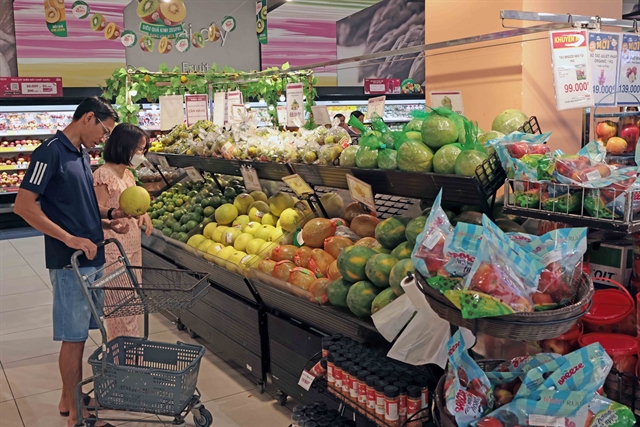 Economy
Economy

 |
| People shop at an Aeon Supermarket in Hà Nội. VNA/VNS Photo Trần Việt |
HÀ NỘI — Việt Nam’s consumer price index (CPI) climbed 3.22 per cent year-on-year, while core inflation rose by 3.01 per cent in the first quarter of 2025, Director of the National Statistics Office (NSO) Nguyễn Thị Hương said.
Hương explained that the first quarter saw significant fluctuations in the global commodity markets due to various political, economic and social factors across different countries. She said strategic competition between major powers continues to intensify, particularly with the new US tariff policies causing trade tensions and affecting global supply chains.
Ongoing military conflicts and political instability across the globe forced many countries to maintain tight monetary policies, resulting in weak aggregate demand and slow global economic growth, she added.
Director of the NSO’s Service and Price Statistics Department Nguyễn Thu Oanh identified the factors contributing to the CPI increase in Q1, saying the food and food service group rising by 3.78 per cent, contributed 1.27 percentage points to the overall CPI growth. Within this category, pork prices increased by 12.49 per cent due to supply shortages amid high demand during the holidays, adding a 0.42 percentage point to the overall CPI increase. Rice prices went up 0.97 per cent, contributing a 0.02 percentage point, while fresh poultry prices climbed 1.06 per cent.
Housing, electricity, water, fuel and construction materials rose 5.11 per cent due to higher prices of cement, steel, sand and rental housing, contributing 0.96 percentage points to the CPI expansion. Household electricity prices increased by 5.11 per cent due to higher demand and the Việt Nam Electricity's adjustment of average retail electricity prices from October 11, 2024, adding a 0.17 percentage point to the overall CPI.
Pharmaceutical products and medical services jumped by 14.4 per cent, contributing a 0.78 percentage point to the CPI growth.
These increases were partially offset by a 2.4 per cent decrease in transport costs as fuel prices dropped 9.73 per cent and railway passenger transport services were down 6.06 per cent in Q1. In addition, the education group decreased by 0.61 per cent, lowering the overall CPI by 0.04 percentage points, as several provinces and centrally-run cities exempted or reduced tuition fees for the 2024-25 academic year. Postal and telecommunications group fell by 0.59 per cent, reducing the CPI by 0.02 percentage points.
The NSO said core inflation, 3.01 per cent, was lower than the average CPI increase primarily because food prices, electricity, and medical services – major contributors to CPI growth – are excluded when calculating core inflation.
In March alone, the CPI dropped slightly, by 0.03 per cent from the previous month. However, it still rose 1.3 per cent from December 2024 and 3.13 per cent from the same period last year.
The Government had implemented numerous measures including ensuring stable supply chains, reducing lending rates, accelerating public investment and cutting value added tax, Hương said, adding market prices remain stable and inflation under control. — VNS




